Rifles vs Shotguns Guide: Learn the Differences & More
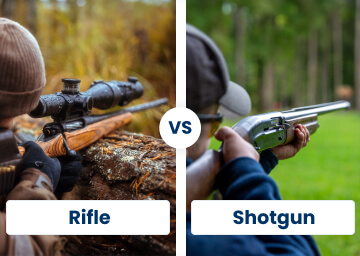
You’ve crossed your hunting license, your destination, and camo clothing off your hunting trip checklist. Now, you only have to choose either a shotgun or a rifle before you head out! In this guide, you’ll learn all about the differences between rifles vs shotguns so you have the most unforgettable hunting trips.
Key Takeaways
- Rifles vs Shotguns: What’s the Difference? Shotguns have shorter barrels that are smoother and fire multiple pellets or a single slug. Rifles have grooved bores, longer barrels, and fire a single bullet.
- What Are Shotguns? You can find shotguns in different gauges and types, such as semi-automatic or pump-action. People use them for hunting and home defense.
- What Are Rifles? Rifles have long barrels that are effective over long distances. They are available in a wide range of calibers.
- Shotgun vs Rifles: Which Is Better for Home Defense? Rifles fire off a single bullet at high speeds, while shotguns can create large wound channels. Both types can be solid options for home defense.
Rifles vs Shotguns: What’s the Difference?
Shotguns feature smooth bores that create scatter patterns of pellets — ideal for hitting close-range, moving targets. Rifles have grooved bores and a single-focused trajectory (great for precisely hitting stationary targets).Shotguns have more of a push rather than a kick when firing and make loud 'booms’. A rifle’s performance depends on the caliber and ammo used. When shooting a rifle, you’ll feel a stronger kick. These firearms differ in terms of recoil, noise level, and other aspects detailed below:
| Comparing Shotguns vs Rifles | ||
|---|---|---|
| Category | Rifles | Shotguns |
| Types of Ammo | A wide range of rifle cartridges | Various types of shotshells |
| Projectiles | Single, jacketed bullets | Multiple pellets or a single slug |
| Recoil | Can vary from light to heavy | Moderate to heavy |
| Noise Level | Generally louder than shotguns | Can be loud, especially with short barrels |
| Range | Effective at longer distances with a bullet range of 600-800 yards | Effective at shorter distances with a bullet range of 20-150 yards |
| Bore Walls | Rifled barrels | Smooth bore or rifled barrels |
| Accuracy | Generally more precise | Generally less precise |
| Barrel Length | Varies, typically 16-26 inches | Often shorter, 18-24 inches |
| Weight | Varies widely based on the type | Can be heavy, especially with long barrels |
| Price | $140 - $2,600 | $150 - $4,000 |
| Hunting Game | Moose, elk, deer, and bear | Dove, ducks, turkey, and deer |
Types of Shotgun & Rifle Ammo
When it comes to rifles and shotguns, understanding the types of ammunition is key to choosing the right one for you. Rifles use a cartridge, round, or load as ammunition. Popular brands like Remington and Winchester offer a variety of options.Meanwhile, shotguns rely on shotshells: birdshot for small game and birds and buckshot for home defense or larger game. Shotgun slugs offer enhanced accuracy and stopping power at longer ranges.
Shotgun & Rifle Projectiles
Shotguns and rifles use very different projectiles (more specifically ammunition). The type of projectile has a huge impact on a firearm’s performance.
Rifles fire a single bullet, which moves quickly through the air. This makes them excellent for long-distance shooting.
Shotguns — sometimes called scatter guns — release multiple projectiles simultaneously. This makes them practical for close-range encounters.
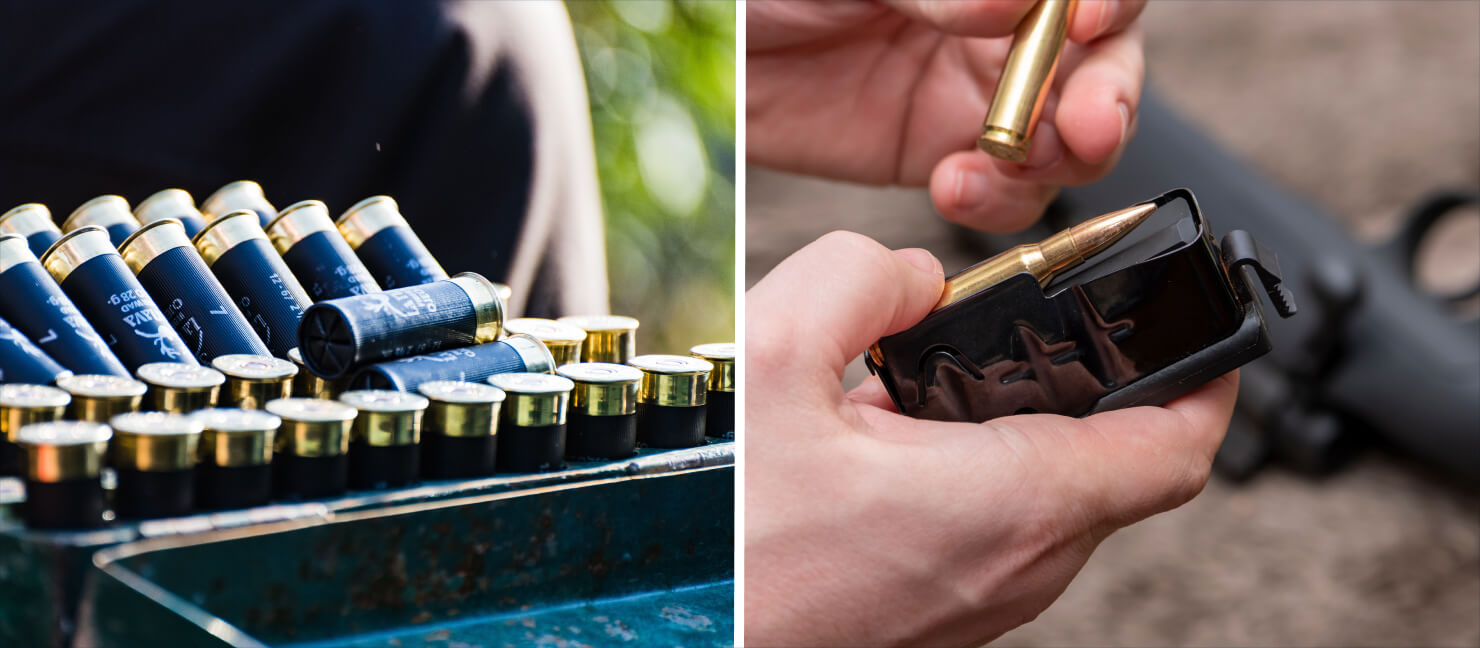
Recoil for Shotguns & Rifles
Recoil can play a huge factor when choosing either a shotgun or rifle. No matter which firearm you end up with, you’ll need to control and manage its recoil.
Rifle recoil varies from light to heavy, (depending on the rifle's weight). Smaller or more petite shooters may find it easier to manage some rifles’ recoil. Keep in mind that rifles have more of a sharper jolt or kick to them rather than a push.
Shotguns can generally produce higher recoil energy than rifles. For example, 12-gauge shotguns can generate 17-54 pounds of recoil energy, depending on the type of ammo used. Shotguns have more of a push to it rather than a jolt or kick.
Shotgun & Rifle Noise Level
Whether you’re indoors or outdoors, shooters and spectators around you should use noise protection to protect everyone’s hearing. According to the CDC, extended noise exposure above 70 decibels (dB) can begin to impair your hearing. Noises above 120 dB can harm your ears — even without prolonged exposure.
Rifles can produce loud noise — especially when firing indoors. Big-bore rifles can reach 175 decibels, so protecting your ears is necessary.
Compared to rifles, shotguns are usually gentler on the ears. But they can still pack a punch! For example, A 12-gauge shotgun registers around 153 decibels.
| Firearm Decibel Chart | ||
|---|---|---|
| Firearm Type | Average Decibels | Details & Notes |
| Average Rifle | 158 dB | Gunshot decibels based on the average rifle |
| Average Shotgun | 155 dB | Gunshot decibels based on the average shotgun |
| Average Pistol | 158 dB | Gunshot decibels based on the average pistol |
| 20-Gauge Shotgun | 154.75 dB | At the muzzle in a 22" barrel |
| 12-Gauge Shotgun | 151.5 dB | At the muzzle in a 28” barrel |
| 12-Gauge Shotgun | 161.5 dB | At the muzzle with 3” shells using a shotgun choke (in an 18.5” barrel) |
| 10-Gauge Shotgun | 161.4 dB | At the muzzle with 3.5” shells using a shotgun choke |
| .243 Caliber Rifle | 160.6 dB | Shooting unsuppressed, this ammo can average around 160 dB depending on the firearm or shooting environment |
| .30-06 Springfield Caliber Rifle | 163.6 dB | This ammo averages between 150-170 dB depending on the firearm or shooting environment |
| .270 Winchester Caliber Rifle | 161.9 dB | Shooting unsuppressed, this ammo can average between 161-162 dB depending on the firearm or shooting environment |
| 7mm Remington Magnum | 166.5 dB | Depending on the rifle, barrel length, & shooting environment, 7mm Remington Magnum ammo can also reach as low as 157.5 dB (using a 20” barrel) |
| 9mm Caliber Handgun | 159.8 dB - 163 dB | 9mm ammo & pistols (as well as their design or features) vary |
| .45 ACP Caliber Handgun | 157.0 dB - 165.0 dB | .45 ACP ammo, handguns, & shooting environments affect this average (higher Db generated from a 1911 pistol) |
| .357 Magnum | 164.3 dB - 169.0 dB | .357 Magnum ammo, pistols, & shooting environments affect this average |
Expert Tip:
Sound pressure levels (and thus decibels) only increase as you modify firearms with muzzle brakes or porting. Always wear ear protection when shooting a firearm.
General Range for Rifles & Shotguns
Rifles are the go-to choice for longer-distance shooting. They feature a range of 500-600 yards for more precise shots.
Shotguns excel in closer range. Their range varies depending on the ammunition used: typically spanning 25-40 yards.
Shotgun & Rifle Bore Walls
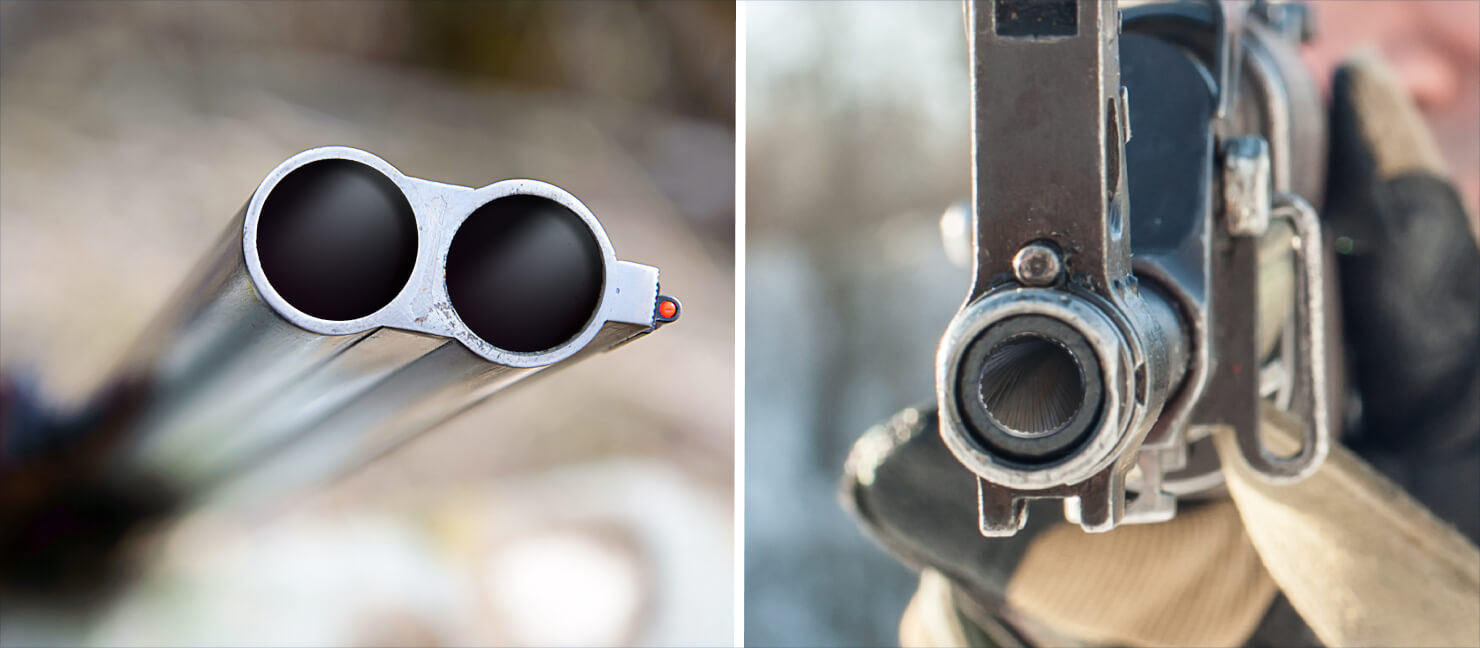
One of the key distinctions between a rifle vs shotgun is their interior bore walls. Rifles feature spiral grooves inside their bore walls (known as rifling). This rifling transfers spin to the bullet, enhancing accuracy for long-range precision shooting.Meanwhile, shotguns have smooth interior bore walls. This design allows for a more ‘sprayed’ (or spread out) dispersion of multiple projectiles. Shotguns are highly effective for close-range applications because of this design!
Shotgun & Rifle Accuracy
When it comes to accuracy, rifles typically outperform shotguns. See how rifles and shotguns compare in this aspect. Rifles are more accurate. They are ideal for longer distances. There’s also a lower risk of projectiles hitting unintended targets.Meanwhile, hunters primarily use shotguns for hunting game (like turkey) at shorter distances. However, their pellet spread can make achieving pinpoint accuracy on the target challenging. Shotgun chokes are a good way to better control the pellets’ spread.
Barrel Length of a Rifle & Shotgun
In general, rifles have longer barrels than shotguns. Always check the laws in your state regarding barrel length. Most rifle barrels span between 18-30” in length, whereas shotguns have a shorter barrel length average of between 18-26 inches.
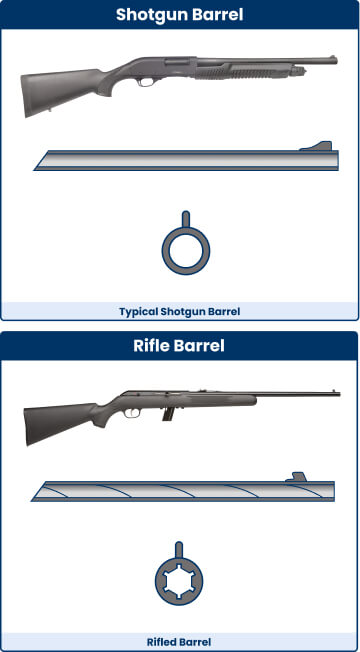
Shotgun vs Rifle Weight
Heavier rifles and shotguns typically have less felt recoil, which can make shooting easier. Take weight into consideration before you decide on a rifle vs a shotgun.
Rifles weigh anywhere from 7-10 lb. On average, most rifles weigh 9 lb.
Shotguns tend to weigh 8-10 lb. Lighter guns provide an advantage as you swing your gun (helpful for skeet shooting).
Typical Rifle & Shotgun Prices
Shotguns are usually cheaper than rifles. However, keep in mind that both firearms come in a variety of models — ranging from budget-friendly to more premium options.
Rifles can cost anywhere from a few hundred to several thousand dollars. The wide range allows beginners and seasoned enthusiasts to find a rifle that fits their needs.
Shotguns also come in a wide price range but are priced slightly below rifles. Whether you're a casual hunter or a dedicated shooter, you can find a shotgun that meets your requirements.
Expert Tip:
Although rifles can be pricey, some have airgun alternatives — perfect for young shooters or practicing in the offseason! Learn more about BB guns, pellet guns, & other airsoft options.
Hunting Game Options for Shotguns & Rifles
In some cases, hunters CAN use either firearm when hunting certain animals that fit in the small game and predator categories (rabbits, squirrels, coyotes, etc.). However, rifles and shotguns do suit and shine when hunting specific kinds of game. Learn whether you should grab a rifle vs a shotgun for your next deer, turkey, or waterfowl hunt:
| Shotgun vs Rifle: Best Choices for Hunting Game | ||||
|---|---|---|---|---|
| Game Type | Shotgun Suite | Rifle Suited | Ammo Type | Recommended Caliber |
| Deer | Not Usually | Yes | Rifle cartridges, shotgun shells, or slug | .243 Win, .270 Win, .30-06, 12 gauge |
| Waterfowl | Yes | No | Shotgun shells | 12 gauge, 20 gauge |
| Upland Birds | Yes | No | Shotgun shells | 12 gauge, 20 gauge |
| Small Game (e.g., rabbits, squirrels) | Yes | Yes | Shotgun shells, Rimfire cartridges | 12 gauge, .22 LR |
| Big Game (e.g., elk, moose) | No | Yes | Rifle cartridges | .270 Win, .300 Win Mag, .338 Win Mag |
| Turkey | Yes | No | Shotgun shells | 12 gauge, 20 gauge |
| Predators (e.g., coyotes) | Yes | Yes | Shotgun shells, Centerfire cartridges | 12 gauge, .223 Rem, .243 Win |
What Are Shotguns?
Shotguns are versatile firearms used in various fields, including hunting, self-defense, and recreational shooting. They’re known for their distinct, smooth barrels that direct pellets inside of shotshells. You’ll find shotguns in different types: pump-action, semi-automatic, and over-under shotguns.Experts categorize shotguns based on their operating systems. Manufacturers offer a range of barrel lengths (typically 18-40 inches). These firearms are known for their adaptability and effectiveness in a wide range of shooting scenarios.
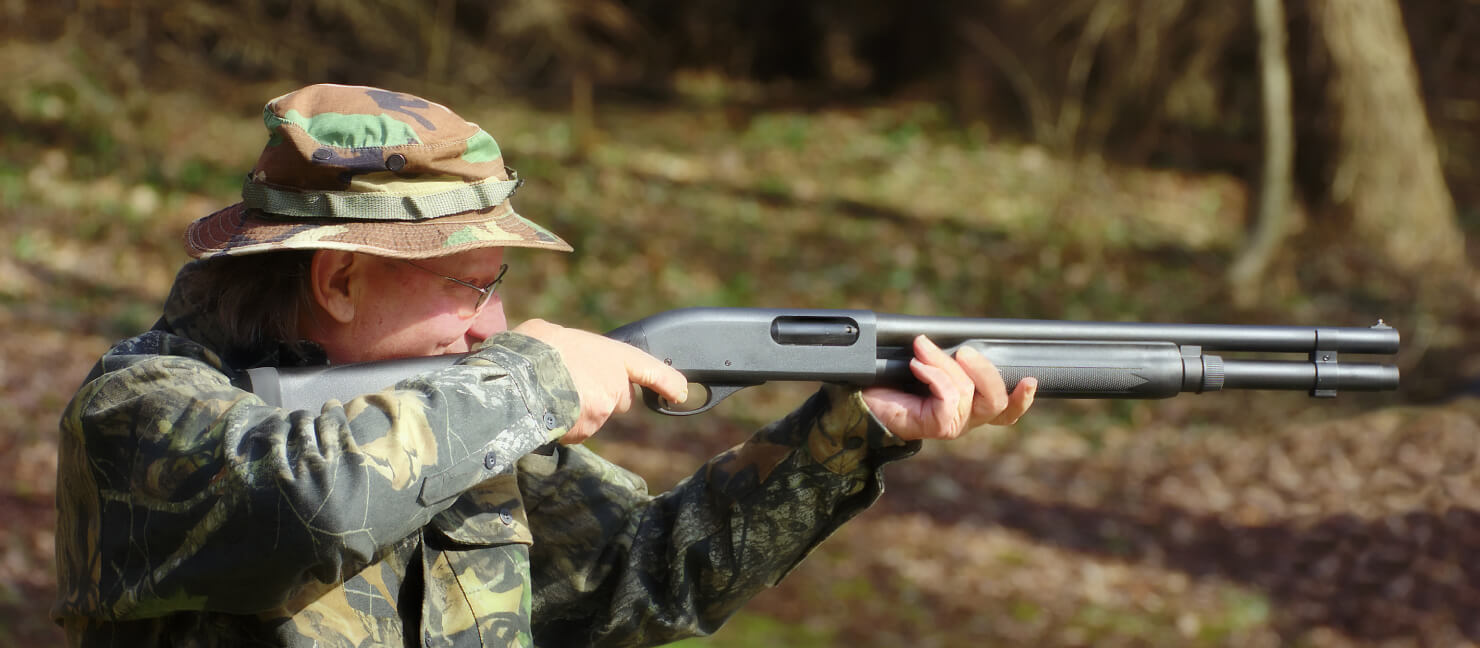
Shotgun Gauges + Chokes
Gauge: The term 'gauge' refers to the diameter of the shotgun's bore or barrel. Two of the most popular gauge options are the 12 gauge and the 20 gauge.
Chokes: Choke tubes are accessories that can be attached to the shotgun's muzzle, allowing you to constrict the end to tighten or spread out the range of the bullets you fire. Read our guide to learn more about how shotgun chokes work.
What Are Rifles?
Rifles are firearms with rifled barrels that direct ammunition to spin. This barrel type generally enhances accuracy and aids in better bullet trajectory. They share a similar appearance with shotguns due to their long barrels — usually ranging from 16 to 24 inches in length. Faraway targets are no match for rifles! Easily hit game like deers and elk from sometimes as much as 300 feet away. You’ll find rifles in various types: semi-automatic and bolt-action rifles.
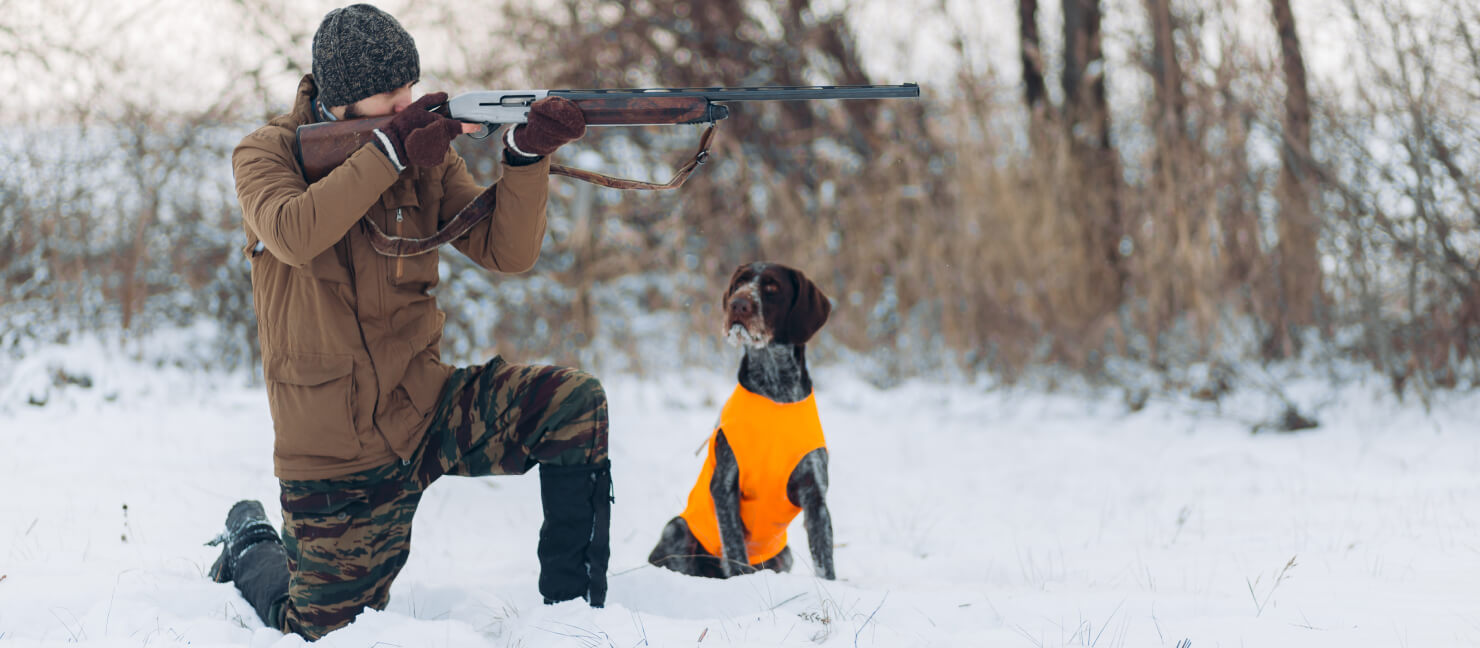
Rifle Caliber
‘Caliber’ is simply a measurement unit that indicates the diameter of the ammunition and the rifle bore. Gun manufacturers design each rifle to accommodate a particular caliber and to take specific cartridges.
Shotgun vs Rifle: Which Is Better for Home Defense?
Both shotguns and rifles can serve as effective tools for home defense, but each offers unique advantages to meet different preferences and needs.
Rifles are equipped with high-speed projectiles and can have substantial ammunition capacity. The single-bullet firing mechanism reduces the chance of stray bullets, making it safer for home defense.
A 12-gauge shotgun can deliver considerable energy (depending on the chosen ammunition). Shotguns are generally less disorienting to the shooter, making them easier to handle in high-stress situations.
Have Fun Out There!
Ready to reload? Whether you're gearing up for turkey hunting with a 12-gauge or need a reliable rifle for home defense, we offer a diverse selection to kickstart your journey. At Academy, we provide a range of shotguns, rifles, and ammunition to meet all your firearm needs.
 Gift Cards
Gift Cards Hot Deals
Hot Deals Big Fun Deals
Big Fun Deals Clearance
Clearance

